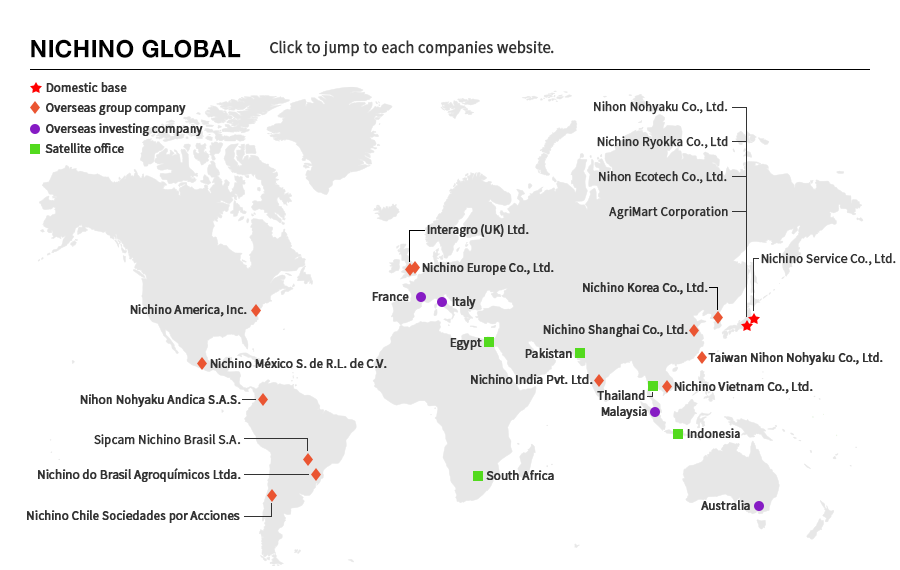Corporate Governance
Nihon Nohyaku Corporate Governance Guidelines
Formulated: November 13, 2015
Implemented: December 22, 2015
Revised: November 13, 2018
Revised: June 26, 2020
Revised: June 21, 2023
I.Basic Approach
1.Basic Approach to Corporate Governance
Nihon Nohyaku aims to be a company that earns the trust of its shareholders, customers, employees, business partners, local communities, and various other stakeholders. To this end, the company shall endeavor to constantly maintain an optimal system of corporate governance in line with the basic approach set forth below, believing that it will facilitate sustainable corporate growth and enhance medium- to long-term corporate value.
- Nihon Nohyaku will adopt a company with an Audit and Supervisory Committee in order to strengthen the oversight function of the Board of Directors and further enhance corporate governance through futher strengthning of monitoring system. The Board of Directors shall establish and uphold the Basic Policies and Action Charter, which every officer and employee of the company shall hold in common and which shall govern every business activities of the company.
- Nihon Nohyaku shall honor the rights of its shareholders. It shall endeavor to prepare an environment wherein shareholders can exercise their rights appropriately, and to secure substantive fairness for shareholders.
- Nihon Nohyaku recognizes the importance of its social responsibility and public mission. The company shall work with stakeholders as appropriate in order to foster a corporate culture conducive to wholesome business operations underlined by steadfast self-discipline.
- In order to earn the trust of its stakeholders and the community and further enhance its corporate value, Nihon Nohyaku shall set compliance with laws, ordinances, and corporate ethics as its cornerstone, and aim to ensure transparency and fairness in decision-making, and construct an aggressive system of corporate governance to facilitate swift and bold decision-making that is premised on such.
- Nihon Nohyaku recognizes the importance of the ecological and social challenges associated with sustainability. The company shall work to fulfil its social responsibility as a company that deals in chemical substances, and enhance its corporate value.
- Nihon Nohyaku shall ensure a diverse balance of viewpoints and values, and pursue diversity with a view to achieving sustainable growth.
- In order to prepare a foundation for constructive dialogue with stakeholders, Nihon Nohyaku shall separately establish a Disclosure Policy; moreover, the company shall promote appropriate disclosure of company information, including information on non-financial operations, and transparency in its corporate management.
- Nihon Nohyaku shall engage in constructive dialogue with stakeholders so as to contribute toward its sustainable growth and the enhancement of its medium- to long-term corporate value.
2.Internal Control System
Nihon Nohyaku shall establish compliance, and risk management committees, and the Inter Control and Audit Dept. assesses the operational status of internal control system for financial reporting, and the officers in charge of these committees shall report to the Board of Directors on the state of the committee's activities. This policy is intended to ensure the effectiveness of the internal control system.
3.Disclosure of Nihon Nohyaku's Policies on Risk Management, Internal Control Systems, etc.
The Board of Directors shall, pursuant to the Companies Act and any other relevant legislation, determine the policies that Nihon Nohyaku and its subsidiary companies will adopt with respect to risk management, internal control systems, legal compliance, and similar matters, and it shall disclose such policies in a timely and appropriate manner.
The Board of Directors shall comply with relevant legislation, including the Companies Act and the Financial Instruments and Exchange Act, and with the regulations on financial exchange; moreover, it shall disclose all matters related to finances or operations in a fair, thorough, and plain manner.
II. Ensuring Shareholders Rights, Fairness, etc.
1.General Shareholders’ Meetings
Nihon Nohyaku shall undertake the following to ensure that its shareholders have sufficient opportunity to consider the proposals of general shareholders’ meetings and that they can exercise their voting rights appropriately.
- Send convening notices for general shareholders’ meetings as far in advance of the date specified in laws and ordinances as possible
- Publish the information stated in convening notices on TDnet and the company website; the timing of such publication shall be after the Board of Directors adopts a resolution on the convocation of the general shareholders’ meeting and before the issuance of a convening notice for said meeting
- Provide English translations of the agenda and proposals of general shareholders’ meetings and publish them on the company website
- Participate in the TSE-operated electronic voting rights exercise platform (TSE platform)
- In addition to the above, take all steps necessary to provide shareholders with information that will help them make appropriate decisions on the exercise of their voting rights, and to foster an environment conducive to the exercise of voting rights
2.Strategic Shareholdings and the Exercise of Voting Rights with respect to such
In order to build stable and long-lasting relationships with business partners, facilitate business alliances, and streamline and strengthen collaborate business development, Nihon Nohyaku shall strategically obtain and hold shares of its business partners where it deems that doing so would contribute to the medium- to long-term corporate value of the company and its subsidiaries.
Nihon Nohyaku shall evaluate the rationality and effectiveness etc. of the major strategic shares that it holds pursuant to the above paragraph (hereunder, “Strategic Shareholdings”), giving consideration to whether they offer medium- to long-term rationality and maintain or strengthen comprehensive relationships with business partners, etc.; moreover, it shall report its findings at the Board of Directors.
In addition, Nihon Nohyaku shall promptly sell Strategic Shareholdings that do not match our policy of holding.
Nihon Nohyaku shall in principle agree to company proposals for the exercise of voting rights with respect to Strategic Shareholdings, provided that such resolutions do not contravene the provisions of the preceding paragraph. For all other proposals, Nihon Nohyaku shall decide on each proposal separately after comprehensively assessing the impact of the proposal on the group, including whether it would contribute to enhancing medium- to long-term corporate value.
3.Protection of Shareholders’ Rights
In order to ensure that its Directors fulfill their fiduciary duties toward shareholders, Nihon Nohyaku shall, with regard to policies that may entail changes in control or significant dilution of shares, duly assess the necessity and rationality of such policies, ensure appropriate procedures, and disclose information in a timely and appropriate manner.
III.Dialogue with Shareholders
1. Policy for Promoting Constructive Dialogue with Shareholders
- Nihon Nohyaku shall place importance on constructive dialogue with shareholders, and the officer in charge of investor relations shall supervise efforts to foster such dialogue through a range of avenues.
- Through constructive dialogue, the Company shall endeavor to gain shareholders' understanding toward its management policies and listen to the opinions of the shareholders, and it shall absorb and reflect the management-related analyses and opinions as part of an effort to achieve sustainable growth and enhance its medium- to long-term corporate value.
IV.Consideration of Interests of Stakeholders
1.Conflicts of Interest
Directors shall promptly notify the Board of Directors of any personal interest that constitutes an actual or potential conflict of interest, and obtain the Board of Directors' authorization with respect to the matter.
2.Relationship with Stakeholders
The Board of Directors shall consider not only the interests of the Nihon Nohyaku's shareholders but also those of its stakeholders in order to enhance its corporate value in the long term.
3.Internal Reporting System
Nihon Nohyaku shall establish, separately to its internal reporting system, an internal reporting system that enables all its officers and employees to promptly and appropriately notify a compliance officer or external law office of any illegal or improper practice.
4.System for Managing Related Party Transactions
When engaging in transactions with its officers or major shareholders, except where the conditions of said transaction are clearly akin to general trading conditions, Nihon Nohyaku shall submit the matter in advance to the Board of Directors and obtain its approval to ensure that the interests of the company and its shareholders are not harmed.
V.Supervisory Duties of the Board of Directors
1.Role of the Board of Directors
- The Board of Directors, entrusted by the shareholders, shall be responsible for achieving an effective and robust system of governance, through which Nihon Nohyaku shall pursue sustainable growth and maximize its medium- to long-term corporate value for the benefit of all shareholders, who desire increased profit through the maximization of medium- to long-term corporate value.
- In order to fulfill their role as stipulated in the preceding paragraph, the Board of Directors shall perform an auditing function with respect to the execution of business by operating officers and business affairs generally, and ensure fairness and transparency in business administration. It shall also shall make decisions on important business execution matters within the bounds stipulated in laws, ordinances, the Articles of Association, and the Board of Directors’ Regulations.
- With regard to resolutions pertaining to business execution matters that are not considered important business matters as stipulated in the preceding article or any other matters, the Board of Directors shall delegate such matters to a lower deliberative body such as a Board of Executive Officers or to the officer(s) in charge of the relevant business, and it shall monitor the performance of duties by said management meeting or officer(s).
- Outside Directors shall monitor the performance of duties by the Board of Directors and senior management, and monitor conflicts of interest between Nihon Nohyaku and the management from a stakeholder perspective in order to achieve sustainable growth and enhance medium- to long-term corporate value.
2. Role of Independent Officers
- Nihon Nohyaku’s independent officers shall undertake evaluations and appraisals as needed concerning the company’s business results and the management’s performance with reference to the business strategy and/or business plan determined by the Board of Directors. Based on such evaluation and appraisal, they shall decide whether it is appropriate to entrust the administration of the company to the current management from a perspective of whether the management is delivering profitability to all shareholders.
- In order to fulfill the role stated in the above paragraph, Nihon Nohyaku’s Independent Officers shall hold annual meetings consisting exclusively of Independent Officers in order to freely discuss matters concerning the company’s corporate governance and business.
3. Ensuring that the Board of Directors has Sufficient Time for Considering the Agenda
The Board of Directors shall work to enhance the quality of its deliberations and ensure its effective and efficient operation. To this end, it shall ensure that there is sufficient time for deliberating on all matters, particularly strategic matters, and that each Director can obtain the relevant information in a timely manner.
VI.Effectiveness of the Board of Directors
1. Composition of the Board of Directors
- The Board of Directors shall have no more than 18 Directors (excluding Audit and Supervisory Committee Members) and no more than 5 Directors who are Audit and Supervisory Committee Members, the number of which is stipulated in the Articles of Association. The precise number shall, in principle, be a number that is necessary and appropriate for ensuring an effective management structure that performs its role of overseeing the company’s business execution and for ensuring substantive deliberations in Board of Directors. In deciding the number of members, consideration shall also be given to securing diversity and expertise for the Board of Directors.
- Nihon Nohyaku recognizes the importance of Outside Directors to corporate governance. The company shall appoint in principle 2 or more independent Outside Directors to the Board of Directors.
- The Board of Directors shall formulate and disclose independence standards for the selection of Independent Officers
- In selecting nominees for the office of Director, Nihon Nohyaku shall aim to achieve a balance of talent, including individuals who bring their particular expertise to a wide variety of business fields and those who are suited to business management; moreover, it shall ensure that the Board of Directors features a balance and diversity of knowledge, experience, and skills as befits a research and development-oriented company.
2. Voluntary Establishment of Advisory Body
- Nihon Nohyaku shall establish a Governance Committee as an advisory body to the Board of Directors to further enhance corporate governance.
- The Governance Committee shall examine and advise on the matters brought to its attention by the Board of Directors, including matters concerning the process for selecting nominees and dismissal for the office of Director (excluding Audit and Supervisory Committee Members) or Director who are Audit and Supervisory Committee Members, the required qualities of and reasons for selecting or dismissing such, the independence standards for the selection of Independent Officers, evaluations of the effectiveness of the Board of Directors, and remuneration for officers.
- Independent Officers shall, in principle, comprise a majority of the Governance Committee.
- The Board of Directors shall make decisions on matters such as the selection of nominees for the office of Director and remuneration for officers after having received advice on such matters from the Governance Committee.
3.Director Qualifications
- In selecting nominees for the office of Director (excluding Audit and Supervisory Committee Members), Nihon Nohyaku shall select individuals who have the character, insight, talent, and depth of experience expected of a Director (excluding Audit and Supervisory Committee Members) of the company, and who exhibit high ethical standards. Diversity of the Board of Directors shall also be taken into account.
- In selecting nominees for Independent/Outside Director (excluding Audit and Supervisory Committee Members), Nihon Nohyaku shall select individuals from a broad pool of candidates based on the criteria set forth in the preceding paragraph, and also the eligibility requirements listed below.
- Nominees shall fulfill Nihon Nohyaku’s independence standards, and their selection shall not present an actual or potential conflict of interest with general shareholders.
- Nominees shall understand Nihon Nohyaku’s management philosophy, and substantially understand its social responsibilities and roles.
- Nominees shall be substantially aware of the roles of an Outside Director. They shall be able supervise the Directors and management of Nihon Nohyaku, and provide appropriate and insightful advice by leveraging their expertise in business fields such as corporate management, economic trends, legal affairs, accounting, tax matters, and corporate auditing.
4.Director (who are Audit and Supervisory Committee Members) Qualifications
- In selecting nominees for Director (who are Audit and Supervisory Committee Members), Nihon Nohyaku shall select individuals from a broad pool of candidates based on the eligibility requirements listed below and having obtained the approval of the Audit and Supervisory Committee.
- Nominees shall have extensive knowledge and experience in business management and business operations.
- Nominees shall be able to monitor the Directors' (excluding Audit and Supervisory Committee Members) execution of duties from an objective and fair perspective, and contribute to the robustness and transparency of management.
- Of the nominees selected, at least 1 shall have substantial insight in fiscal and accounting matters.
- Notwithstanding the provisions of the preceding paragraph, in selecting nominees for Director who are Independent Outside Audit and Supervisory Committee Members, Nihon Nohyaku shall select individuals from a broad pool of candidates based on the eligibility requirements listed below and having obtained the approval of the Board of Corporate Auditor.
- Nominees shall fulfill Nihon Nohyaku's independence standards, and their selection shall not present an actual or potential conflict of interest with general shareholders.
- Nominees shall understand Nihon Nohyaku's management philosophy, and substantially understand its social responsibility and role.
- Nominees shall be sufficiently aware of the roles of an Outside Director. They shall be able supervise the execution of Directors' duties from a neutral and objective perspective and contribute to the robustness and transparency of management by leveraging their expertise in business fields such as corporate management, economic trends, legal affairs, accounting, tax matters, and corporate auditing.
5.Succession Plan
- The president shall, upon assuming office or as necessary, indicate to the Board of Directors the eligibility requirements for their successors in the office of president.
- When the president retires, the Board of Directors shall decide on suitable successor based on the requirements stipulated in the preceding paragraph and having considered the opinion of the Governance Committee.
6.Roles and Responsibilities of Directors
- Directors shall gather information as necessary to perform their duties, and proactively contribute their opinions in discussions.
- Directors shall exhibit the skills required of their office, devote due time and attention to the interests of Nihon Nohyaku, and fulfill their duties as Directors.
- Upon assuming office, Directors shall understand relevant laws and ordinances, the Articles of Association, the Board of Directors' Regulations, and other internal regulations, and substantially understand their duties as stipulated in such.
7.Outside Directors
- Outside Directors shall have the right to request from the Secretariat of the Board of Directors any additional information as they may deem necessary for the fulfilment of their roles and responsibilities. Outside Directors shall also have the right, when they deem it necessary, to obtain advice from external experts, and Nihon Nohyaku shall bear the expenses related to such.
- Independent Outside Directors shall nominate a Senior Independent Outside Director by mutual vote, and contribute toward an organizational framework consisting of liaison and coordination with core management and collaboration with individual Corporate Auditors and the Board of Corporate Auditors.
8.Directors' Training
- Nihon Nohyaku shall gather and provide to Directors information on economic trends, industry trends, legal compliance, corporate governance, financial accounting, and any other information that will help them perform their roles and responsibilities.
- After assuming office, Nihon Nohyaku's Outside Directors shall, as and when necessary, receive briefings from the relevant departments and/or officers about the company's business strategy, business plan, the state of the business operations concerned, the business environment, and business challenges, etc., and they shall form a substantial understanding on such matters.
9.Determining the Agenda for the Meeting of the Board of Directors
- The Chair of Nihon Nohyaku's Board of Directors shall determine the agenda and the major items for meetings of the Board of Directors as well as the date of convening said meetings, having considered the proposals and opinions of Directors.
- The Chair of the Board of Directors shall collaborate with the president in determining the agenda for each meeting of the Board of Directors in advance.
- Materials pertaining to the agenda and items for meetings of the Board of Directors shall be distributed to Directors, including Outside Directors, well in advance of the date of the meeting (except where a proposal is highly confidential) to ensure substantial discussion at the meeting.
10.Independent Officers' Access to Internal Information
Whenever it is deemed necessary or appropriate, Nihon Nohyaku's Independent Officers shall request explanations or reports from Internal Directors, Executive Officers, or employees, or request the provision of internal materials.
11.Audit and Supervisory Committee and Directors who are Audit and Supervisory Committee Members
- Nihon Nohyaku shall establish a Secretariat of the Audit and Supervisory Committee and provide it with a personnel and budget sufficient to enable the Audit and Supervisory Committee to perform their duties appropriately.
- To ensure the objectivity of corporate auditors, Nihon Nohyaku shall guarantee the Secretariat of the Audit and Supervisory Committee independence from the Board of Directors (excluding Audit and Supervisory Committee Members) with respect to matters such as instructions in the performance of work and personnel evaluations.
- To enhance information gathering capacity, the Audit and Supervisory Committee Members shall collaborate with Outside Directors (excluding Audit and Supervisory Committee Members) in such a way that it does not influence their independence.
12.Self-assessments
- Directors shall undertake self-assessments each year with respect to the effectiveness of the Board of Directors and their personal performance as Director, and they shall report their findings to the Board of Directors. The Board of Directors shall each year seek the advice of the Governance Committee regarding the analysis and evaluation of the effectiveness of the Board of Directors as a whole, and, based on the Governance Committee's recommendations, formulate and implement an action plan for the improvement of the same.
- Nihon Nohyaku shall disclose the summary of the analysis stipulated in the preceding paragraph in a timely and appropriate manner.
VII.Remuneration System
1. Remuneration for Directors etc.
- Nihon Nohyaku shall adopt an appropriate, fair, and balanced system of remuneration for Executive Directors that is linked to the long-term interests of shareholders, and that increases Executive Directors’ motivation to maximize the corporate value of the company.
- Remuneration for independent Outside Directors shall be commensurate with the time and work that the Independent Outside Director concerned contributed to Nihon Nohyaku, and it shall not include any elements of performance-linked pay.
- Nihon Nohyaku shall, pursuant to the provisions of Section 2, Chapter VI, seek the advice of the Governance Committee regarding Directors’ (excluding Audit and Supervisory Committee Members) remuneration, and, based on the findings thereof, determine the content of the proposal for Directors’ (excluding Audit and Supervisory Committee Members) remuneration that the Board of Directors will submit to the general shareholders’ meeting as well as the individual amounts of remuneration.
- When Nihon Nohyaku seeks the advice of the Governance Committee on individual amounts of remuneration pursuant to the provisions of Section 2, Chapter VI, the Governance Committee shall decide and advice on the appropriateness of remuneration amounts, taking into consideration the standards of remuneration used in other companies that offer a valid comparison. In undertaking this process, the Governance Committee shall also consider factors such as the standards of remuneration for other officers and employees of the company and for the officers and employees of other companies within the same industry as the company.








